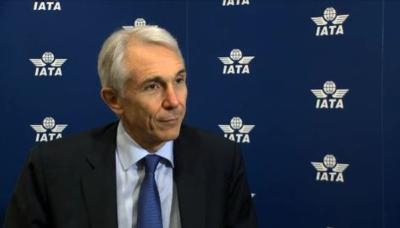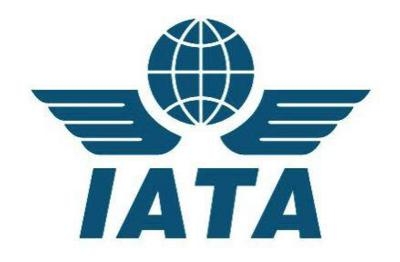Wed, Jun 05, 2013
Votes 'Overwhelmingly' In Favor Of Caps At 69th Annual General Meeting
The International Air Transport Association (IATA) 69th Annual General Meeting (AGM) overwhelmingly endorsed a resolution on “Implementation of the Aviation Carbon-Neutral Growth (CNG2020) Strategy."

“Airlines are committed to working with governments to build a solid platform for the future sustainable development of aviation. Today, they have come together to recommend to governments the adoption of a single MBM for aviation and provide suggestions on how it might be applied to individual carriers. Now the ball is in the court of governments. We will be strongly supporting their leadership as they seek a global agreement through the International Civil Aviation Organization (ICAO) at its Assembly later this year,” said Tony Tyler, IATA’s Director General and CEO (pictured).
Environment will be at the top of the agenda for the 38th ICAO Assembly in September. The aviation industry urgently needs governments to agree, through ICAO, a global approach to managing aviation’s carbon emissions, including a single global MBM. IATA member airlines agreed that a single mandatory carbon offsetting scheme would be the simplest and most effective option for an MBM.
The resolution provides governments with a set of principles on how governments could:
- Establish procedures for a single market-based measure (MBM)
- Integrate a single MBM as part of an overall package of measures to achieve CNG2020
“For governments, finding agreement on MBMs will not be easy. It was difficult enough for the airlines, given the potential financial implications. Bridging the very different circumstances of fast growing airlines in emerging markets and those in more mature markets required a flexible approach and mutual understanding. But sustainability is aviation’s license to grow. With that understanding and a firm focus on the future, airlines found an historic agreement. This industry agreement should help to relieve the political gridlock on this important issue and give governments momentum and a set of tools as they continue their difficult deliberations,” said Tyler.

Aviation is the first industry to suggest a global approach to the application of a single MBM to manage its climate change impact. This keeps aviation in the forefront of industries on managing carbon emissions. It was also the first to agree global targets. These are: improving fuel efficiency by 1.5% annually to 2020, capping net emissions with CNG2020, and cutting emissions in half by 2050 compared to 2005. And it was also the first to agree on a global strategy to achieve them.
An MBM is one of the four pillars of the aviation industry’s united strategy on climate change. Improvements in technology, operations and infrastructure will deliver the long-term solution for aviation’s sustainability. “Today’s agreement focuses on a single global MBM as part of a basket of measures. A single MBM will be critical in the short-term as a gap-filler until technology, operations and infrastructure solutions mature. So we cannot take our eye off the ball on developing sustainable low-carbon alternative fuels, achieving the Single European Sky or the host of other programs that will improve aviation’s environmental performance,” said Tyler.
An MBM should be designed to deliver real emissions reductions, not revenue generation for governments. The principles agreed apply to emissions growth post-2020. “Airlines are delivering results against their climate change commitments. For example, we are on track to achieve our 1.5% average annual fuel efficiency target. We need governments to be serious partners as well. Developing an MBM must not become an excuse for revenue generation by cash-strapped governments, or for avoiding incentivizing investments in new technologies and sustainable low-carbon alternative fuels,” said Tyler.
More News
Aero Linx: International Business Aviation Council Ltd IBAC promotes the growth of business aviation, benefiting all sectors of the industry and all regions of the world. As a non->[...]
"During the annual inspection of the B-24 “Diamond Lil” this off-season, we made the determination that 'Lil' needs some new feathers. Due to weathering, the cloth-cove>[...]
Also: Bushcat Woes, Hummingbird 300 SL 4-Seat Heli Kit, Carbon Cub UL The newest Junkers is a faithful recreation that mates a 7-cylinder Verner radial engine to the airframe offer>[...]
Also: Seaplane Pilots Association, Rotax 916’s First Year, Gene Conrad After a decade and a half of struggling with the FAA and other aero-politics, G100UL is in production a>[...]
Also: Martha King Scholarship, Montaer Grows, Textron Updates Pistons, FlySto The FAA is hiring thousands of air traffic controllers, but the window to apply will only be open for >[...]
 ANN's Daily Aero-Linx (04.16.24)
ANN's Daily Aero-Linx (04.16.24) Aero-News: Quote of the Day (04.16.24)
Aero-News: Quote of the Day (04.16.24) Airborne 04.10.24: SnF24!, A50 Heritage Reveal, HeliCycle!, Montaer MC-01
Airborne 04.10.24: SnF24!, A50 Heritage Reveal, HeliCycle!, Montaer MC-01 Airborne 04.12.24: SnF24!, G100UL Is Here, Holy Micro, Plane Tags
Airborne 04.12.24: SnF24!, G100UL Is Here, Holy Micro, Plane Tags Airborne-Flight Training 04.17.24: Feds Need Controllers, Spirit Delay, Redbird
Airborne-Flight Training 04.17.24: Feds Need Controllers, Spirit Delay, Redbird




